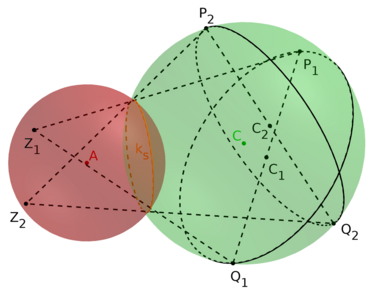Constant chord theorem


The constant chord theorem is a statement in elementary geometry about a property of certain chords in two intersecting circles.
The circles and intersect in the points and . is an arbitrary point on being different from and . The lines and intersect the circle in and . The constant chord theorem then states that the length of the chord in does not depend on the location of on , in other words the length is constant.
The theorem stays valid when coincides with or , provided one replaces the then undefined line or by the tangent on at .
A similar theorem exists in three dimensions for the intersection of two spheres. The spheres and intersect in the circle . is arbitrary point on the surface of the first sphere , that is not on the intersection circle . The extended cone created by and intersects the second sphere in a circle. The length of the diameter of this circle is constant, that is it does not depend on the location of on .
Nathan Altshiller Court described the constant chord theorem 1925 in the article sur deux cercles secants for the Belgian math journal Mathesis. Eight years later he published On Two Intersecting Spheres in the American Mathematical Monthly, which contained the 3-dimensional version. Later it was included in several textbooks, such as Ross Honsberger's Mathematical Morsels and Roger B. Nelsen's Proof Without Words II, where it was given as a problem, or the German geometry textbook Mit harmonischen Verhältnissen zu Kegelschnitten by Halbeisen, Hungerbühler and Läuchli, where it was given as a theorem.
References
- Lorenz Halbeisen, Norbert Hungerbühler, Juan Läuchli: Mit harmonischen Verhältnissen zu Kegelschnitten: Perlen der klassischen Geometrie. Springer 2016, ISBN 9783662530344, p. 16 (German)
- Roger B. Nelsen: Proof Without Words II. MAA, 2000, p. 29
- Ross Honsberger: Mathematical Morsels. MAA, 1979, ISBN 978-0883853030, pp. 126–127
- Nathan Altshiller Court: On Two Intersecting Spheres. The American Mathematical Monthly, Band 40, Nr. 5, 1933, pp. 265–269 (JSTOR)
- Nathan Altshiller-Court: sur deux cercles secants. Mathesis, Band 39, 1925, p. 453 (French)
External links
- constant chord theorem as problem at cut-the-knot.org
 |
